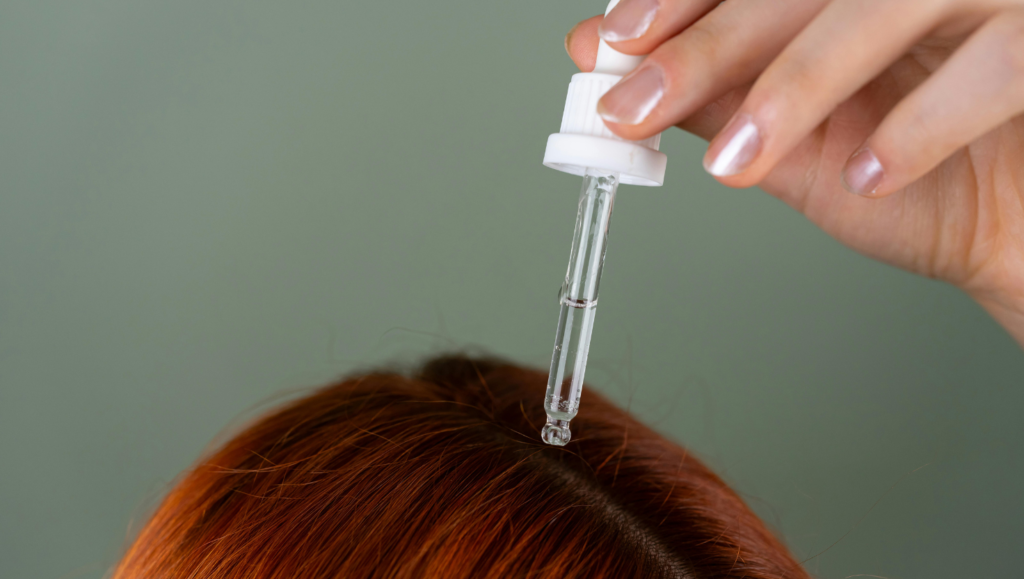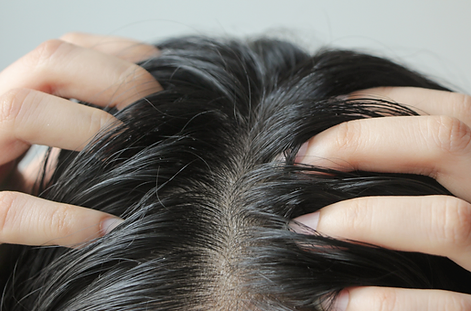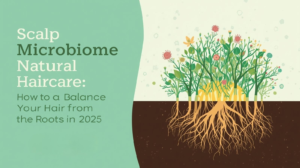
Table of Contents
While people focus on their skincare and make sure they use just the right products, they often sideline hair care. To be more precise, we often sideline our scalp health.
It is necessary to take care of your scalp as much as you take care of your skin and body. While picking out a shampoo or any haircare product, we focus solely on hair, not the scalp.
Yes, scalp and hair (strands) are two different things!
In addition to nourishing the skin that shields your head from injury and illness, taking care of your scalp can help you create a healthy environment for your hair to flourish.
In this article, we’ll learn in detail everything about the scalp and find out whether your scalp is healthy or not, and what we can do. Let’s get into it.
Signs Of An Unhealthy Scalp:
It is crucial to understand the signs of an unhealthy scalp. If you want healthy, lustrous, and perfect hair, you should take care of your scalp.
The process of growing your hair starts underneath the skin, so by the time it emerges from the hair follicle, it has already taken shape.
It is why your scalp and its structures are necessary for all follicular activity, including the production of new hair and the growth of existing hair.
The indications of an unhealthy scalp are:
1]. Dry And Itchy Scalp
The cause of your skin’s drying out may need to be determined.
- You may spot a dry scalp by looking for loose, white, powdery flakes that collect in the hair.
- A dry scalp is the result of the skin in that area getting irritated and flaking offExtreme cold, dry air, allergies to goods you use on your scalp, contact dermatitis, and other conditions can all contribute to a dry scalp.
- Shampoos, conditioners, gels, and hairspray can all cause allergic responses.
2]. Dandruff
- Skin cells that are white or yellowish make dandruff flakes.
A scalp condition like psoriasis or eczema may be the cause of your dandruff.
Dandruff may also be caused by not washing your hair frequently enough, stress, hormones, ageing, and changes in temperature (such as cold weather).
3]. Accumulation of excessive oil and products
You may wish to alter your haircare regimen.
- When the scalp still has product on it, and you do not clean it regularly, product buildup on the scalp occurs.
Use a clarifying shampoo as part of your regular hair care routine for a quick and easy fix.
4]. Hair loss
- Hair loss occurs as a result of the scalp drying out, which further harms the hair follicles and the hair follicles’ gradual upward growth.
The hairs then start to thin out until they eventually stop growing altogether.
Hair loss may be brought on by inherited reasons, hormonal changes, aggressive styling methods, or more transient conditions.
What Is A Healthy Scalp?
Given that your scalp is covered in abundant hair, it can occasionally be challenging to tell whether it is at its healthiest and happiest, but it’s still important to check.
Oil production that is balanced, clean, moisturized skin, adequate blood flow, and the lack of irritation, itching, and flaking are all signs of a healthy scalp.

How To Take Care Of The Scalp?
1]. Keep Your Scalp Nourished:
- It’s crucial for regulating your scalp microbiota to consume your recommended daily allowance of vitamins.
Dark green vegetables like broccoli and kale, lean proteins like chicken, beans, and tofu, and nuts and seeds are all crucial components of a diet that is good for the scalp.
You can improve your scalp health by taking supplements that contain vital minerals, including biotin, vitamin B12, and iron.
2]. Keep Your Scalp Clean:
- Keep your scalp clean to keep it healthy.
To maintain balance and prevent buildup, consider frequently detoxifying with Clarifying Shampoo.
3]. Keep Your Scalp Hydrated:
- You can aid yourself in this situation by using a soft, hydrating shampoo and conditioner and by staying away from harsh chemicals and styling products that remove the natural oils from the scalp.
4]. Exfoliate The Scalp:
- Use a sulfate-free shampoo scrub to detoxify your hair for a profound, cooling impact.
Extreme buildup will be eliminated, giving you the chance for the brand-new beginning you may desire.
5]. Do Not Stress:
- Most of the time, our bodies can tell when we are beginning to feel overwhelmed.
It is because stress has an immediate impact on our hormone levels, which can promote dandruff, oily hair, and scalp acne.
To reduce stress and enhance the health of your scalp, download a meditation app or think about practising backyard yoga in the sun.
6]. Take Care Of Your Diet:
- Start from the inside and work your way outside if you’re unsure.
A simple strategy to treat a dry scalp is to include fish oils and omega-3 fatty acids in your diet.
Consider adding extra protein-based meals to your weekly menu because a diet high in protein is necessary for healthy hair.
7]. Limit Sun Exposure:
- It’s crucial to protect our scalps in the same manner that we are careful about how much of our body and face we expose to the sun.
- Even though a sunburn on your scalp may initially only cause the typical soreness and peeling, with time, it may turn into something more serious, such as skin cancer
Conclusion:
Having a regimen that is specially created for your scalp type and conditions is vital when it comes to scalp care.
Regular scalp care will not only provide your hair follicles with a strong base but will also hydrate and safeguard the skin on your scalp.
If you liked this guide and want to learn more about hair care, here’s all you need.
- Basics of Hair Care: The Complete Guide
DIY Hair Tonic to Regrow Lost Hair | Powerful Remedy for All Hair Types
Summer Hair Care Routine Silky Shiny Frizz Free Hair | Homemade DIY Hair Mist
Check out the video on how to prepare a scalp scrub at home!
If you’re not a part of our amazing family, you’re missing out. Join us today and start your natural skincare and haircare journey, and get help from other community members. 😊



